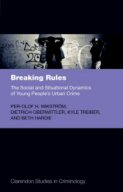Biography
Beth Hardie worked with Professor P-O Wikström from 2004 - 2020 on the Peterborough Adolescent and Young Adult Development Study (PADS+). She was a research associate and also a member of the Centre for Analytic Criminology at the University of Cambridge. She conducted the stand-alone 2005 Peterborough Community Survey (and oversaw the 2012 follow-up), and went on to conduct many fieldwork interviews with the PADS+ participants. From 2006, as the Research Manager of PADS+, Dr Hardie was responsible for fieldwork staff and the collection, quality and management of PADS+ data, as well contributing to the development and application of the research instruments used and devised by PADS+. Her varied work since 2004 on this multi-method multi-level longitudinal study means she is experienced in developmental and social ecological research methods and analytical techniques, as well as the operational demands of running a world-class large-scale longitudinal research study. Dr Hardie is also responsible for the analysis and presentation of PADS+ spatial data using GIS, the training of international collaborative and replica study staff, and is jointly responsible for the co-ordination of the I-SAT (international comparison of tests of Situational Action Theory) project.
Beth Hardie graduated from the University of Cambridge with a BA in Social and Political Sciences in 2004. She has an academic background in the social sciences with a focus on developmental and social psychology and criminology. Her research is grounded in an analytical approach that integrates individually and environmentally focused explanations of human behaviour, including crime. Dr Hardie was awarded a PhD in Criminology from the University of Cambridge in 2017. Her research reflects a particular and critical interest in the data collection and analytical methodology required for the analysis of situational interaction (the interaction between people and settings) in action, and contributes to the development of the situational model of Situational Action Theory with regards parental monitoring.
Research
Situational Action Theory, Peterborough Adolescent and Young Adult Development Study, adolescent crime, Analytical Criminology, parental monitoring, person-environment interaction, Space-Time Budget, situational methodology
Publications
Monographs
- Hardie, B. (in press). Studying Situational Interaction: Clarifying and demonstrating appropriate analysis of person-environment interaction to explain behaviour. Springerbriefs in Criminology; Springer. Link
- Hardie, B. (2017). Why monitoring doesn't always matter: The situational role of parental monitoring in adolescent crime. University of Cambridge. Link
- Wikström, P-O H., Oberwittler, D., Treiber, K. and Hardie, B. (2012) Breaking rules: The social and situational dynamics of young people's urban crime. Oxford: Oxford University Press. Link
 |
|
Book sections
- Hardie, B., & Wikström, P.-O. H. (in press). Space-Time Budget methodology: Facilitating social ecology of crime. In J. C. Barnes & D. R. Forde (Eds.), Encyclopedia of research methods and statistical techniques in Criminology and Criminal Justice. Wiley.
- Wikström, P-O H., Treiber, K., & Hardie, B. (2012). Examining the role of the environment in crime causation: small-area community surveys and space-time budgets. In D. Gadd,S. Karstedt, & S. F. Messner (Eds.), The SAGE handbook of criminological research methods. SAGE.Link
Journal articles
- Hardie, B. (2019). “Why Monitoring Doesn’t Always Matter: The Interaction of Personal Propensity with Physical and Psychological Parental Presence in a Situational Explanation of Adolescent Offending.” Deviant Behavior Link
- Wikström, P-O H., Mann, R., & Hardie, B. (2018). Young people's differential vulnerability to criminogenic exposure. In J. Reinecke & H. Hirtenlehner (Eds.), European Journal of Criminology: Special issue on testing Situational Action Theory 15(1). Link
- Hirtenlehner, H., & Hardie, B. (2016). On the conditional relevance of controls: an application of Situational Action Theory to shoplifting. Deviant Behavior, 37(3), 315-331. Link
- Wikström, P-O H., Treiber, K., Hardie, B., & Oberwittler, D. (2015). Felsons's review of “Breaking Rules": Smoke and mirrors. Journal of Criminal Justice Education, 26(1), 115-116. Link
- Bertok, E., Wikström, P-O H., Hardie, B., & Meško, G. (2012). Parental control of teenagers in primary and high school and related deviance. Journal of Criminal Investigation and Criminology/Ljubljana, 63, 4. (in Slovenian language).
- Wikström, P-O H., Ceccato, V., Hardie, B., & Treiber, K. (2010). Activity fields and the dynamics of crime: Advancing knowledge about the role of the environment in crime causation. Journal of Quantitative Criminology, 26(1), 55-87. Link
Republished chapters
- Wikström, P-O H., Oberwittler, D., Treiber, K., & Hardie, B. (2015). Situational Action Theory. Chapter 1 of Breaking Rules republished in McGee, T., & Mazerolle, P. (Eds.), Developmental and life-course criminological theories. Ashgate Publishing.
- Wikström, P-O H., Ceccato, V., Hardie, B., & Treiber, K. (2011). Activity fields and the dynamics of crime: Advancing knowledge about the role of the environment in crime causation. JQC article republished in Natarajan, M. (Eds.), Crime opportunity theories: Routine activity, rational choice and their variants. Ashgate Press.
Media Interviews
Dr Hardie talking in 2012 about the findings published in the book 'Breaking Rules'
- To Laurie Taylor on BBC Radio 4's 'Thinking Allowed' programme on 15th August
- To Bill Buckley on BBC Radio Devon's 'Interactive Lunch' programme on 6th July

